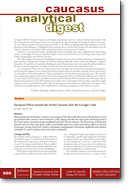Oil Wealth, Patrimonialism, and the Failure of Democracy in Azerbaijan

Author(s): Farid Guliyev
Editor(s): Lili Di Puppo, Iris Kempe, Matthias Neumann, Robert Orttung, Jeronim Perovic
Series: Caucasus Analytical Digest (CAD)
Issue: 2
Pages: 2-5
Publisher(s): Center for Security Studies (CSS), ETH Zurich; Jefferson Institute, Washington D.C.; Heinrich Böll Foundation, Tbilisi; Research Centre for East European Studies, University of Bremen
Publication Year: 2009
